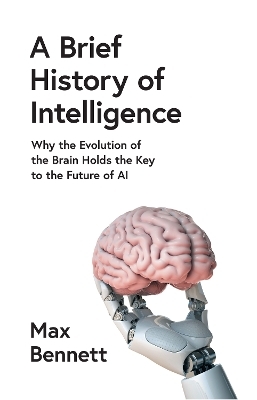
A brief history of intelligence
why the evolution of the brain holds the key to the future of AI
Seiten
2023
|
1. Auflage
William Collins (Verlag)
978-0-00-856010-2 (ISBN)
William Collins (Verlag)
978-0-00-856010-2 (ISBN)
A Brief History of Intelligence bridges the gap between AI and neuroscience by telling the evolutionary story of how the brain came to be.
The entirety of the human brain’s 4-billion-year story can be summarised as the culmination of five evolutionary breakthroughs, starting from the very first brains, all the way to the modern human brains. Each breakthrough emerged from new sets of brain modifications, and equipped animals with a new suite of intellectual faculties.
These five breakthroughs are the organising map to this book, and they make up our itinerary for our adventure back in time. Each breakthrough also has fascinating corollaries to breakthroughs in AI. Indeed, there will be plenty of such surprises along the way. For instance: the innovation that enabled AI to beat humans in the game of Go – temporal difference reinforcement learning – was an innovation discovered by our fish ancestors over 500 million years ago. The solutions to many of the current mysteries in AI – such as ‘common sense’ – can be found in the tiny brain of a mouse. Where do emotions come from? Research suggests that they may have arisen simply as a solution to navigation in ancient worm brains. Unravelling this evolutionary story will reveal the hidden features of human intelligence and with them, just how your mind came to be.
The entirety of the human brain’s 4-billion-year story can be summarised as the culmination of five evolutionary breakthroughs, starting from the very first brains, all the way to the modern human brains. Each breakthrough emerged from new sets of brain modifications, and equipped animals with a new suite of intellectual faculties.
These five breakthroughs are the organising map to this book, and they make up our itinerary for our adventure back in time. Each breakthrough also has fascinating corollaries to breakthroughs in AI. Indeed, there will be plenty of such surprises along the way. For instance: the innovation that enabled AI to beat humans in the game of Go – temporal difference reinforcement learning – was an innovation discovered by our fish ancestors over 500 million years ago. The solutions to many of the current mysteries in AI – such as ‘common sense’ – can be found in the tiny brain of a mouse. Where do emotions come from? Research suggests that they may have arisen simply as a solution to navigation in ancient worm brains. Unravelling this evolutionary story will reveal the hidden features of human intelligence and with them, just how your mind came to be.
As a pioneering artificial intelligence entrepreneur, Max Bennett is well positioned to bridge the gap between AI and evolutionary neuroscience. He spent the bulk of his career as the Co-Founder & Chief Product Officer of Bluecore, one of the fastest growing AI companies in the world, most recently valued at over $1 billion dollars. Max taught himself neuroscience and has subsequently published numerous scientific papers in peer reviewed scientific journals on the topics of evolutionary neuroscience, intelligence and the neocortex. He has spoken at multiple conferences and groups on the topic of neuroscience and AI, including Numenta, Karl Friston’s group, and AI4.
| Erscheinungsdatum | 20.10.2023 |
|---|---|
| Verlagsort | London |
| Sprache | englisch |
| Maße | 153 x 234 mm |
| Gewicht | 510 g |
| Einbandart | kartoniert |
| Themenwelt | Sachbuch/Ratgeber ► Natur / Technik |
| Informatik ► Theorie / Studium ► Künstliche Intelligenz / Robotik | |
| Medizin / Pharmazie ► Medizinische Fachgebiete ► Neurologie | |
| Naturwissenschaften ► Biologie ► Humanbiologie | |
| ISBN-10 | 0-00-856010-2 / 0008560102 |
| ISBN-13 | 978-0-00-856010-2 / 9780008560102 |
| Zustand | Neuware |
| Informationen gemäß Produktsicherheitsverordnung (GPSR) | |
| Haben Sie eine Frage zum Produkt? |
Mehr entdecken
aus dem Bereich
aus dem Bereich
Buch | Softcover (2024)
REDLINE (Verlag)
20,00 €
was sie kann & was uns erwartet
Buch | Softcover (2023)
C.H.Beck (Verlag)
18,00 €


